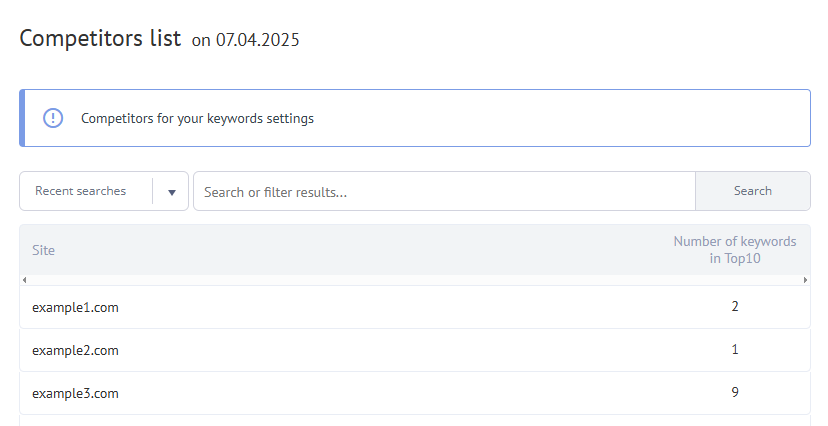Website Competitors
In the digital landscape, understanding your competitors is crucial for achieving success. Competitor analysis allows businesses to identify strengths, weaknesses, and opportunities in their market. This article will delve into effective tools and strategies for benchmarking against competitors, providing insights that can enhance your SEO efforts.
Importance of Competitor Analysis
Competitor analysis is a vital component of any successful SEO strategy. By analyzing your competitors, you can uncover valuable insights that help you refine your approach. Here are some key reasons why competitor analysis is essential:
- Identify market trends and shifts.
- Understand your competitors' strengths and weaknesses.
- Discover new opportunities for growth.
- Improve your own SEO strategies through benchmarking.
Benchmarking Against Competitors
Benchmarking is the process of comparing your performance metrics against those of your competitors. This practice helps you identify areas for improvement and set realistic goals. Here are some key metrics to focus on when benchmarking:
- Organic traffic: Compare your website's organic traffic with that of your competitors.
- Keyword rankings: Analyze the keywords your competitors rank for and their positions.
- Backlink profile: Assess the quality and quantity of backlinks pointing to your competitors' websites.
- Domain authority: Compare your domain authority with that of your competitors to gauge your overall SEO strength.
Competitor Research Strategies
Implementing effective competitor research strategies is essential for gaining actionable insights. Here are some strategies to consider:

1. Identify Your Competitors
The first step in competitor analysis is identifying who your competitors are. This includes both direct competitors (those offering similar products or services) and indirect competitors (those targeting the same audience with different offerings). Use tools like Google Search and industry reports to find website competitors.
2. Analyze Competitor Websites
Once you've identified your competitors, it's time to analyze their websites. Look for key elements such as:
- Content quality and relevance.
- User experience and design.
- Page load speed and mobile responsiveness.
- SEO practices, including meta tags and keyword usage.
By examining these aspects, you can gain insights into what works well for them and what could be improved in your own strategy.
3. Monitor Social Media Presence
Social media platforms are essential for understanding how competitors engage with their audience. Monitor their social media channels to assess:
- Engagement levels (likes, shares, comments).
- Content types that resonate with followers (videos, infographics, articles).
- Customer interactions and feedback.
This information can inform your own social media strategy and help you connect better with your audience.
4. Utilize SEO Tools for Data Gathering
Leveraging SEO tools is crucial for gathering data on your competitors. Tools like SEMrush, Ahrefs, and Moz can provide detailed reports on:
- Keyword rankings and performance.
- Backlink profiles and sources.
- Traffic estimates and sources.
This data is essential for conducting a thorough website competitive analysis and identifying gaps in your own strategy.
Key Areas to Focus on in Competitor Analysis
To conduct a comprehensive competitor analysis, focus on the following key areas:
1. Keyword Strategy
Analyze the keywords your competitors are targeting. Identify high-performing keywords that drive traffic to their sites. This can help you uncover gaps in your own keyword strategy and discover new opportunities for optimization.
2. Content Strategy
Evaluate the content your competitors are producing. Look for content types that resonate with their audience, such as blog posts, videos, or infographics. Understanding their content strategy can help you create more engaging and relevant content for your own audience.
3. Backlink Profile
Assess the backlink profiles of your competitors. Identify high-quality backlinks that contribute to their domain authority. This information can guide your own link-building efforts and help you secure valuable backlinks.
4. User Engagement Metrics
Analyze user engagement metrics such as bounce rate, average session duration, and pages per session on your competitors' websites. This data can provide insights into their user experience and help you identify areas for improvement on your own site.
Tracking Competitor Performance
Regularly tracking your competitors' performance is essential for staying ahead in the competitive landscape. Here are some effective ways to track website competitors:
1. Set Up Alerts
Use tools like Google Alerts to set up notifications for your competitors. This will keep you informed about their latest activities, such as new product launches, blog posts, or marketing campaigns.
2. Monitor Keyword Rankings
Regularly check your competitors' keyword rankings using SEO tools. This will help you understand how their SEO strategies evolve and identify new keywords to target in your own campaigns.
3. Analyze Traffic Sources
Use tools like SimilarWeb or SEMrush to analyze your competitors' traffic sources. Understanding where their traffic comes from (organic search, paid ads, social media, etc.) can inform your own marketing strategies.
4. Review Content Updates
Keep an eye on your competitors' content updates. Regularly review their blogs, articles, and social media posts to understand their content strategy and identify trends in your industry.
Conclusion
In conclusion, conducting a thorough competitor analysis is essential for any business looking to enhance its SEO strategy. By utilizing effective competitor analysis tools and implementing strategic benchmarking against competitors, you can gain valuable insights that drive your success. Remember to continuously track and analyze your competitors to stay ahead in the competitive landscape. With the right tools and strategies, you can effectively improve your website's performance and achieve your business goals.
